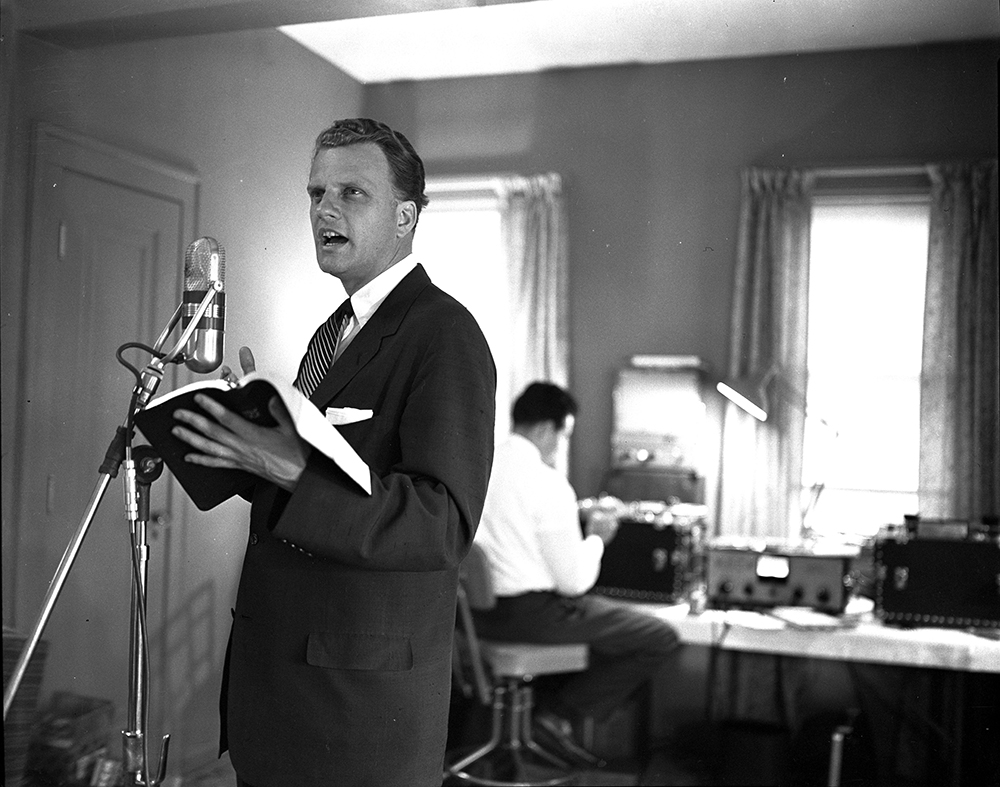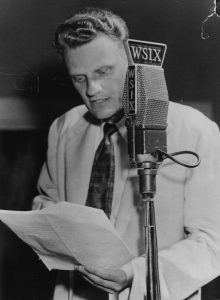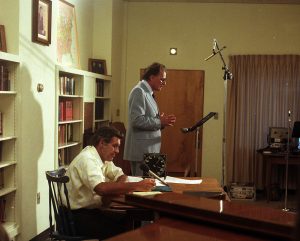Billy Graham Radio: From Local to National to Satellite
November 17, 2017
Categories: BGEA Ministry, Billy Graham, Cliff Barrows
Categories: BGEA Ministry, Billy Graham, Cliff Barrows

Billy Graham’s mission has always been to spread the Gospel in every effective means possible. Once he dipped his toes into the broadcast world, he couldn’t turn back. He began reaching millions through radio. So, how did he go from local to national to satellite radio?
One day, a man named Torrey Johnson called Graham and asked him to take over his 45-minute radio program. It would cost $150 a week for the radio time on WCFL in Chicago. “Little did I realize that it was one of the turning points in my life,” said Graham.
Graham took the request to the deacons of church he pastored, and after the financial needs were provided, they agreed to the offer. He wanted there to be a marquee name on the program, so he invited George Beverly Shea, a bass baritone and a staff announcer at the Moody Bible Institute’s station, WMBI. Shea, after much discussion, finally said he would be part of the program.
 “I built my radio talks around the events of the day,” said Graham. “Keeping up with current events through newspapers and radio news programs, I began each message with a reference to something people would have been hearing and talking about that very day. Then I moved into a biblical message, showing that God and the Scriptures are relevant to every problem.”
“I built my radio talks around the events of the day,” said Graham. “Keeping up with current events through newspapers and radio news programs, I began each message with a reference to something people would have been hearing and talking about that very day. Then I moved into a biblical message, showing that God and the Scriptures are relevant to every problem.”
Billy Graham’s first radio show was doing so well that WMBI signed he and his team up to broadcast their regular Sunday morning service from the church during March and April of 1944.
A few years later in 1950, Billy was speaking at a conference in Michigan. Two men walked up to him and introduced themselves as Fred Dienert and Walter Bennett. They tried to interest him in a national radio program. At that point in time, he was much too busy to be interested in such a thing.
Dienert and Bennett, however, were persistent. They followed Graham to Oregon and showed up outside his hotel, insisting that he consider starting a national radio program. Graham finally said, “All right fellows, if before midnight tonight I should get $25,000 for the purpose of a radio broadcast, I’ll take that as an answer to prayer and be willing to do a national broadcast.”
He thought there was no way that would happen, but God had answered prayer. They took the step of faith and signed a contract to air The Hour of Decision.
The crew, Billy Graham, Cliff Barrows, and Grady Wilson, didn’t know what to do with the $25,000. They didn’t have a separate corporation bank account or even a board of directors. That’s how the Billy Graham Evangelistic Association (BGEA) was founded. Billy called his business manager at Northwestern School, who filed documents establishing the BGEA.
 They signed a contract for thirteen weeks with the American Broadcasting Company to go on their coast-to-coast network. They started airing their program during their upcoming Atlanta Crusade. “Clearly, the Lord was setting our course for the immediate future,” said Graham. “In one year between Los Angeles and Atlanta, we had developed an organization, a radio broadcast, a film ministry, a financial policy, and a compatible Team. Now we needed to find out if all these things would work.”
They signed a contract for thirteen weeks with the American Broadcasting Company to go on their coast-to-coast network. They started airing their program during their upcoming Atlanta Crusade. “Clearly, the Lord was setting our course for the immediate future,” said Graham. “In one year between Los Angeles and Atlanta, we had developed an organization, a radio broadcast, a film ministry, a financial policy, and a compatible Team. Now we needed to find out if all these things would work.”
They sure worked. The Hour of Decision aired for 60 years, turning into The Hour of Decision Online with the advancements in technology. Continuing to use every means possible to share the good news of the Gospel, the BGEA’s audio team began developing more and more ways to be heard.
They began producing radio spots for advertising, and now publish a number of online and broadcast programs such as GPS: God. People. Stories. and Decision Minute.
Most recently, the BGEA has partnered with SiriusXM to have their own channel on satellite radio. “The Billy Graham Channel” is a limited-run channel ending on Nov. 26, 2017, that features Graham’s sermons and personal reflections from family, friends, and U.S. presidents.
